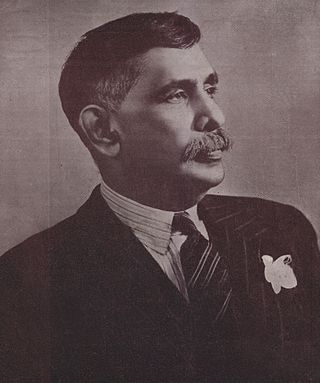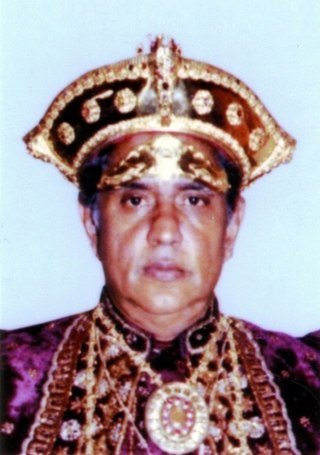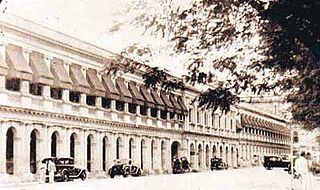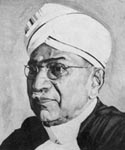
Don Stephen Senanayake was a Ceylonese statesman. He was the first Prime Minister of Ceylon having emerged as the leader of the Sri Lankan independence movement that led to the establishment of self-rule in Ceylon. He is considered as the "Father of the Nation".

Solomon West Ridgeway Dias Bandaranaike, also known as "The Silver Bell of Asia", was a Ceylonese statesman who served as the fourth Prime Minister of the Dominion of Ceylon, serving from 1956 until his assassination. The founder of the left-wing and Sinhalese nationalist Sri Lanka Freedom Party, his tenure saw the country's first left-wing reforms.
The Official Language Act , commonly referred to as the Sinhala Only Act, was an act passed in the Parliament of Ceylon in 1956. The act replaced English with Sinhala as the sole official language of Ceylon, with the exclusion of Tamil from the act.

Ganapathipillai Gangaser Ponnambalam was a Ceylon Tamil lawyer, politician and cabinet minister. He was the founder and leader of the All Ceylon Tamil Congress (ACTC), the first political party to represent the Ceylon Tamils.

Samuel James Veluppillai Chelvanayakam was a Ceylonese lawyer, politician and Member of Parliament. He was the founder and leader of the Illankai Tamil Arasu Kachchi (ITAK) and Tamil United Liberation Front (TULF) and a political leader of the Ceylon Tamil community for more than two decades. Chelvanayakam has been described as a father figure to Ceylon's Tamils, to whom he was known as "Thanthai Chelva".
The origins of the Sri Lankan Civil War lie in the continuous political rancor between the majority Sinhalese and the minority Sri Lankan Tamils. The war has been described by social anthropologist Jonathan Spencer as an outcome of how modern ethnic identities have been made and re-made since the colonial period, with the political struggle between minority Tamils and the Sinhalese-dominant government accompanied by rhetorical wars over archeological sites and place name etymologies, and the political use of the national past.

Deshamanya Nissanka Parakrama Wijeyeratne, known as Nissanka Wijeyeratne, was a Sri Lankan politician, civil servant, diplomat and English language poet. He was also the Diyawadana Nilame of the Sri Dalada Maligawa, Kandy from 1975 to 1985. At the time of death he was serving as the chairman of The Law and Society Trust in Sri Lanka.
Sri Lankan Tamil nationalism is the conviction of the Sri Lankan Tamil people, a minority ethnic group in the South Asian island country of Sri Lanka, that they have the right to constitute an independent or autonomous political community. This idea has not always existed. Sri Lankan Tamil national awareness began during the era of British rule during the nineteenth century, as Tamil Hindu revivalists tried to counter Protestant missionary activity. The revivalists, led by Arumuga Navalar, used literacy as a tool to spread Hinduism and its principles.

The Legislative Council of Ceylon was the legislative body of Ceylon established in 1833, along with the Executive Council of Ceylon, on the recommendations of the Colebrooke-Cameron Commission. It was the first form of representative government in the island. The 1931 Donoughmore Constitution replaced the Legislative Council with the State Council of Ceylon.

Subaiya Natesan was a Ceylonese politician, Member of State Council, Member of Parliament and senator.

Sir Waithilingam Duraiswamy was a Ceylon Tamil lawyer, politician and speaker of the State Council of Ceylon.
The Ministry of Home Affairs is a cabinet ministry of the Government of Sri Lanka responsible for public administration.
The First Board of Ministers was the executive body opposite the State Council of Ceylon between 1931 and 1936. It was formed in July 1931 after the state council election and it ended in December 1935 with dissolution of the first 1st State Council. The Board of Ministers consisted of ten members, three ex-officio British officials and the chairmen of the State Council's seven executive committees. The Chief Secretary was the chairman of the Board of Ministers whilst the Leader of the State Council was its vice-chairman.

The 1st State Council of Ceylon was a meeting of the State Council of Ceylon, with the membership determined by the results of the 1931 state council election held between 13 and 20 June 1931. The parliament met for the first time on 7 July 1931 and was dissolved on 7 December 1935.
Sidambarampillai P. Vythilingam was a Ceylonese politician.
The chief secretary of Ceylon, was the chairman and one of three officers of state of the Board of Ministers of the State Council of Ceylon from 1932 to 1947. The post succeeded that of Colonial Secretary which was one of six offices that held a seat in the Executive Council of Ceylon until 1932.

Themiya Loku Bandara Hurulle is a Sri Lankan politician and Honorary Secretary, Anuradhapura Jaya Sri Maha Bodhi Development Fund a former project minister and a United National Party organiser for Horawupotana Electorate. He was also a provincial councillor and a member of Parliament from Anuradhapura District. He is an engineer by profession.
Jaganathan Tyagaraja was a Ceylon Tamil barrister, politician and member of the State Council of Ceylon.











